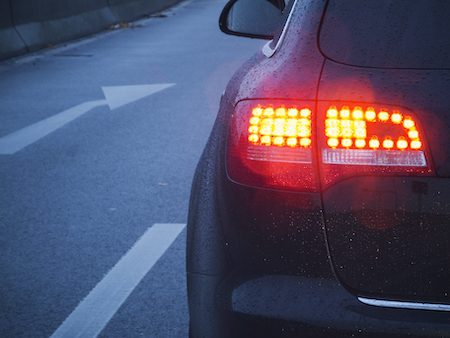What’s one of the most important systems on your vehicle? “Brakes” should be at the top of the list.
Imagine driving through town without working brakes. Think about coming home from a day of skiing, tapping on the brake pedal, and nothing happens. Yep, the brake system is critical.
Yet much of the brake system is hidden from view. You trust it’s there working and doing its job. You can see the tires, noticing if they’re flat or bald. You can tap the brake pedal and feel the pressure. But what about the rest of the system?
Brake pads are crucial for overall operation. Their uniform thickness controls how they operate. If your brakes aren’t performing as well as they should, it may stem from brake pads wearing unevenly.
What are brake pads
The original braking system was nothing more than a block of wood. When a driver wanted to slow the car, they pushed a lever that moved a wooden block against the wheels. The friction was enough to slow and stop the car.
However, that system quickly failed as cars became faster. Brakes got more sophisticated as our technology increased. Here’s how brake pads work.

When you want to slow down, press the brake pedal down. This activates a cylinder that allows brake fluid to move through hoses and down to the calipers. The calipers engage your brake pads. This action causes the brake pads to apply pressure to the rotors located at each wheel. This friction is just what is needed to gain control over each wheel, slowing it down until it comes to a complete stop. Take your foot off the brake pedal, and the entire system sets up by reversing the process.
It’s the brake pads that regulate slowing and stopping. Without brake pads, your car wouldn’t have the same level of control. If they don’t work correctly, you won’t have restraint.
Why brake pads wear unevenly
Brake pads operate through friction. This friction occurs every time you press down on the brake pedal, causing the caliper to push the brake pad against the rotor. Rotors are fast-moving metal discs that push back against the brake pad to slow the vehicle.
Brake pads are powerful components when you compare their size to the job they perform. No more than a few inches in width and length, their solid core is built tough to stand up to a lot of pressure. Each wheel has its own brake pad. It’s normal for front brake pads to wear at different rates than rear brake pads because the front brakes take more force from moving down the road. In theory, the brake pads work in pairs – each pair should wear in the same increments. If the left front brake pad wears differently than the right front brake pad, you have a problem.
What causes brake pads to wear unevenly
There are several reasons brake pads wear down differently on each side.
Guide pins – guide pins are metal pins that give the brake caliper flexibility to move back and forth with the wheels. These pins are in constant action, taking the abuse from the impact of the road. Over time, they can become dirty and corroded, which reduces their ability to move freely from side to side. When this happens, the caliper can stick in one position. It no longer is flush with the brake pad, meaning it creates small spaces between the two materials. Left unchecked and unrepaired, it impacts the functionality of the brake pad.
Calipers – calipers push the brake pads against the rotors. If the caliper doesn’t engage properly, it can wear down the brake pads unevenly. This usually happens if the caliper doesn’t get enough pressure to the piston, or once engaged, it isn’t released in a timely manner. If the piston fires but won’t go back in, it’s a problem for the brake pads.
Rotors – rotors are small metal disks at the center of each wheel. They are more exposed than other parts, and are often subject to damage from debris on the road. Like brake pads, they are created with specific dimensions to fit snugly into the braking system. Debris can sometimes lodge between the brake pad, creating an uneven surface area. Over time, this causes deep grooves in the surface of the brake pads, and can eventually warp the rotors.
Misalignment – sometimes, when new brake pads are installed, they are misaligned. This causes uneven wear right from the start. You should start noticing this after a few weeks or months of wear, depending on how much you drive.
Brake lines – every time you press down on the brake pedal, brake fluid flows through the system to control the braking power. If these brake lines are clogged or damaged, they won’t provide the right brake fluid level. This means pressure will move from the caliper to the brake pad at different quantities, putting varying amounts of pressure onto the rotor as you slow and stop.
It’s your brake pads – schedule an inspection
For most vehicles, car manufacturers recommend that you check and replace brake pads about every 50,000 miles. Of course, it depends on the make and model; your owner’s manual can provide more guidance.
While it’s a good idea to keep mileage in mind for scheduling maintenance visits, you should also pay attention to what your car is telling you. If you notice any signs of braking problems, it’s important to get the system checked out. It’s the surest way to keep you safe.
Brake pads have built-in sensors that alert you when they need replacing. However, with uneven brake wear, you might not reach that point before you start noticing problems. Take note of what happens when you brake, and convey that to your mechanic. They will be able to thoroughly inspect the system and make corrections, as needed.
Visit us today for a full inspection to ensure your entire braking system works well.
